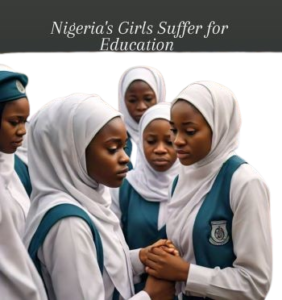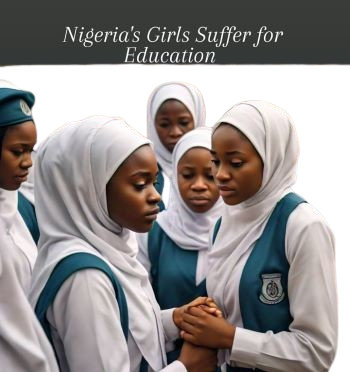Nigeria’s Girls Suffer for Education
Nigeria’s Girls Suffer for Education: A Crisis of Access and Resilience.

Nigeria’s girls face daunting barriers to education amid climate crisis.
Nigeria, Africa’s most populous nation, faces a daunting challenge in educating its future generations. Over 10 million children, aged 5-14, are absent from classrooms, with girls in the northeast and northwest regions facing the most significant barriers. This education crisis is a tangled web of poverty, geography, and gender discrimination, exacerbated by the devastating impact of climate change.
In a country where education is crucial for economic development and social mobility, the denial of this fundamental right to millions of girls is a tragedy. The consequences are far-reaching, perpetuating cycles of poverty, limiting opportunities, and undermining Nigeria’s resilience to climate-related disasters.
The climate crisis has brought unprecedented challenges to Nigeria’s education sector. Rising temperatures, droughts, and extreme weather events like flash floods and landslides have made schools inaccessible and classrooms unsafe. Girls, already marginalized in some communities, are often forced to help their families cope with extreme weather or earn extra income, further compromising their education.
Research by the Brookings Institution reveals a compelling link between girls’ education and climate resilience. Every new year of schooling for girls can improve their country’s resilience to climate-related disasters by 3.2 points. This correlation underscores the critical role education plays in empowering girls to adapt to and mitigate the impacts of climate change.
Organizations like the Center for Girls’ Education in Zaria are working tirelessly to support girls’ education and provide training on climate change mitigation. By equipping girls with knowledge and skills, these initiatives help them support themselves and prepare for a changing climate.
To address this crisis, Nigeria must prioritize girls’ education, addressing the systemic barriers that deny them access to classrooms. This requires a multifaceted approach, involving government, civil society, and community leaders. By working together, Nigeria can ensure its girls receive the education they deserve, building a more resilient and prosperous future for all.
